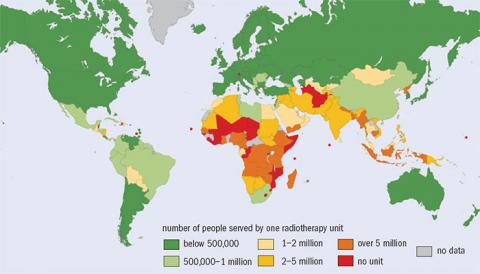If you live in a low- or middle-income country, your chances of surviving cancer are significantly lower than if you live in a wealthier economy, and that’s largely due to the availability of radiation therapy.
A group of international experts in the fields of accelerator design, medical physics and oncology recently met at CERN to try to solve the technical problem of designing a robust linear accelerator (linac) that can be used in more challenging environments.
Between 2015 and 2035, the number of cancer diagnoses worldwide is expected to increase by 10 million, with around 65% of those cases in poorer economies.
It’s estimated that 12 600 new radiotherapy treatment machines will be needed to treat those patients.
“We need to develop a machine that provides state-of-the-art radiation therapy in situations where the power supply is unreliable, the climate is harsh or communications are poor,” explains Manjit Dosanjh, senior advisor for CERN medical applications. “We need to avoid a linac of sub-standard quality that would not only provide lower-quality treatment but would be a disincentive for the recruitment and retention of high-quality staff.”
Limiting factors to the development and implementation of radiotherapy in lower-resourced nations don’t just include the cost of equipment and infrastructure, but also a shortage of trained personnel to properly calibrate and maintain the equipment and to deliver high-quality treatment. The plan is to design a medical accelerator that is affordable, easy to operate and maintain, and robust enough to be used in areas where these operational challenges might occur.
“I grew up in Australia, where the distances to hospitals can be vast, the climate can be harsh and local access to medical experts can quite literally be the difference between life and death,” explains accelerator physicist Suzie Sheehy from the University of Oxford and the Science and Technology Facilities Council (STFC). “In this project, the challenges in different environments will be extremely varied, but it seems obvious to me that those of us on the cutting-edge of research in particle accelerators should rise to the challenge of re-designing systems to make them more available to those who need them. I see this as a challenge and an opportunity to take my research into spaces where it is most needed.”
Jointly organised by CERN, the International Cancer Expert Corps (ICEC) and STFC, the workshop at CERN from 26 to 27 October was funded through the UK’s Global Challenges Research Fund, enabling key participants from Botswana, Ghana, Jordan, Nigeria and Tanzania to share their grass-roots perspectives. Understanding the in-country challenges will improve the effectiveness of the technology under design. Zubi Zubizaretta of the International Atomic Energy Agency (IAEA) also presented the results of the 2017 IAEA Radiation Therapy survey.
This workshop followed on from the inaugural workshop in November 2016, and a future ICEC workshop will look at the education and training requirements for the estimated 130 000 local staff (oncologists, medical physicists and technicians) who will be needed to operate the treatment machines and deliver patient care.
This ambitious project aims to have facilities and staff available to treat patients in low- and middle-income countries within 10 years.
This article was originally posted on the main CERN website.

